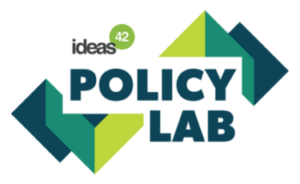Stay Informed
Join our policy listserv
View Events
Register for events and watch past recordings
Learn More
Read our 2023 policy priorities
The ideas42 Policy Lab translates evidence-based research and recommendations by behavioral scientists into concrete and actionable policies. We apply insights from behavioral science to draft and advocate for laws, regulations, and other public policies that foster equity and well-being for all, especially for communities subjected to systemic oppression.
We apply behavioral science to advance evidence-based public policies at the federal, state, and local level that foster equity and well-being for all.
The Policy Lab envisions a world where everyone has the political, social, and economic means and opportunities to lead lives with dignity and autonomy.
The Policy lab will specifically focus on using insights from behavioral science to make concrete recommendations on how laws and regulations can be either adjusted to improve the lives of under-resourced people, or designed anew.
We lead with optimism.
We work in collaboration with others.
We practice patience.
We prioritize equity.
We center lived experience.
One of the most important insights to come from behavioral science over the last 40 years is that the context in which people operate has an outsized impact on how people make decisions and do or do not follow through on those decisions.
Roughly 70% of the variation in individual decision-making can be attributed to the difference in context in which people are operating, and only about 30% is attributable to differences in the people themselves. We all know that changing people is really, really hard, but changing the context in which they operate while not simple is much easier.
Examples of Context
Context can refer to something as small as the ordering of questions on a government form, to something as big as deciding who is eligible to receive government benefits.
Complex Forms
Common contexts: Federal Housing Authority mortgages, college financial aid
Bandwidth Limitations
An ongoing challenge for people experiencing sustained poverty
Discrimination
Being treated differently and unjustly based on factors such as race or income
While not the only force in shaping context, public policy is certainly one of the most significant. When changed, policies have the added effect of immediate scale, impacting the context for millions of people. Whether we like it or not, public policy shapes countless aspects of our lives, from how we access our money to whether or not we can get a college degree, to how much government subsidy we get when we save for retirement or if we can afford a mortgage.
Unfortunately, even well-intentioned policies may not account for how humans actually behave. Too often, policymakers base their decisions on flawed assumptions about what drives behavior, ignoring the ways in which systems shape how people act. Systems are rarely designed to help those who need them the most: those with the fewest financial resources. To drive social change and promote equity, we must focus on the policies and systems that create disadvantage.



